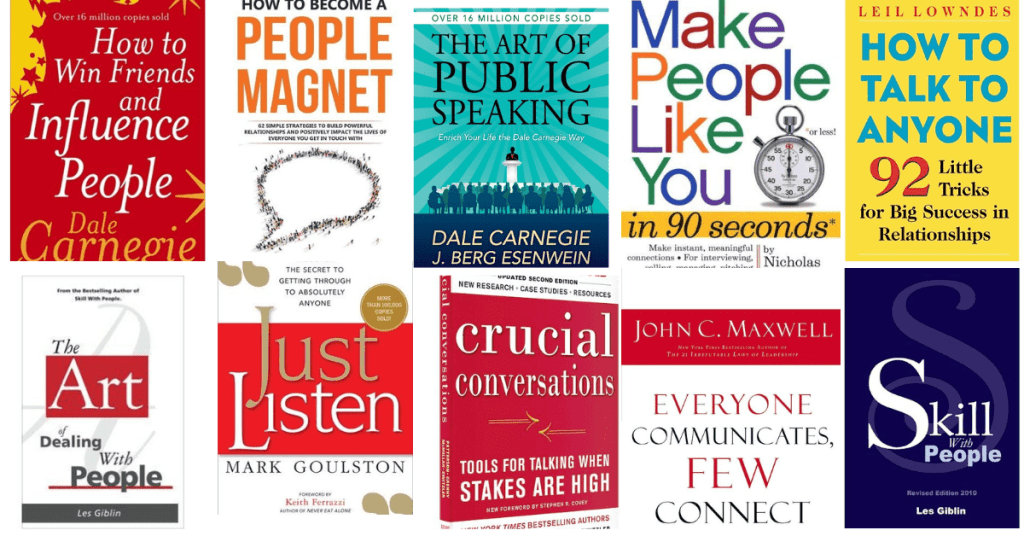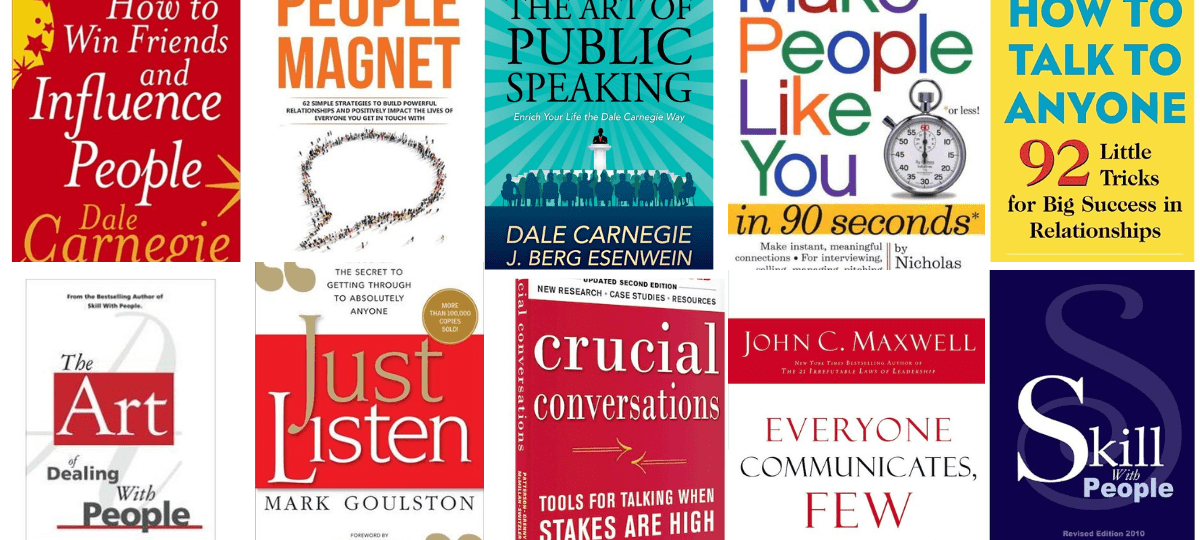8 Books That Might Improve Your Communication and Speaking Skills
Being able to connect with others, communicate effectively, and accomplish both personal and professional objectives are all made possible by having strong communication skills. Many of us need to train and improve our communication abilities, even if other people are born communicators. Thankfully, there are innumerable publications that offer knowledge, methods, and tried-and-true approaches to help us become better communicators and interact with people. Here, we’ll explore eight books that will miraculously improve your ability to converse and communicate.

1. How to Win Friends and Influence People by Dale Carnegie
Why It’s Important Dale Carnegie’s masterpiece has endured for a very good reason. The core ideas of establishing rapport and influencing people in a courteous and organic way are the main topic of this book. In almost any social or professional context, Carnegie’s counsel is useful, realistic, and practical.
Important Takeaways:
Active Listening: A key component of successful communication, Carnegie stresses the value of truly listening to others.
Developing Relationships: He offers techniques for establishing rapport, such as expressing gratitude, demonstrating interest in other people, and refraining from criticizing.
Persuade by Kindness: Carnegie discusses how empathy and compassion may be used to persuade others rather than imposing our own views.
How It Helps:
For those who want to improve their interpersonal abilities, reading this book may be life-changing, particularly if they want to build strong bonds with others at work, home, or in their social circles.
2. Crucial Conversations: Tools for Talking When Stakes Are High by Kerry Patterson, Joseph Grenny, Ron McMillan, and Al Switzler
Why It’s Important When emotions are running high, communication becomes challenging, which is where this book excels. Whether you’re negotiating a contract or discussing a delicate subject with a loved one, it teaches readers how to manage challenging talks with grace and confidence.
Important Takeaways:
Remaining Calm: The writers provide strategies for controlling feelings during heated discussions.
Empathy and Respect: The book offers strategies for making sure your conversation honors the opinions of others.
Clear and Focused Communication: When talking about challenging subjects, learn to keep your point and steer clear of misconceptions.
How It Helps:
This book is perfect for managers, leaders, and anybody else who frequently finds themselves in emotionally charged conversations since it may increase your efficacy and confidence in high-stakes circumstances.
3. Never Split the Difference: Negotiating As If Your Life Depended On It by Chris Voss
Why It’s Important In this best-selling book, former FBI negotiator Chris Voss shares the keys to successful high-stakes negotiations. Although it may appear to be a specialist ability, bargaining is a communication style that can be used in practically every situation, from family relationships to professional talks.
Important Takeaways:
Mirroring and Labeling: Voss presents strategies for labeling and mirroring that can reduce conflict and foster trust.
Tactical Empathy: He emphasizes how crucial it is to comprehend your opponent’s viewpoint in order to obtain an advantage during negotiations.
Effective Listening: Develop the ability to make people feel heard and understood so they are more inclined to agree with you.
How It Helps:
You may learn how to handle difficult conversations, establish limits, and come to agreements without sacrificing your principles or objectives by implementing Voss’s strategies.
4. Talk Like TED: The 9 Public-Speaking Secrets of the World’s Top Minds by Carmine Gallo
Why It’s Important: Carmine Gallo reveals the techniques of the most effective presenters, and TED Talks have established the benchmark for strong, captivating public speaking. Anyone looking to improve their public speaking and presentation abilities should read this book.
Important Takeaways:
Storytelling: Gallo emphasizes the value of using stories to captivate an audience and leave a lasting impression.
Passion and Connection: He describes how having a deep interest in a subject may spread like wildfire and strengthen your relationship with your audience.
Successful Visuals: Discover how to use images and media to support your message rather than detract from it.
How It Helps:
You may enhance your ability to communicate ideas in meetings, speeches, and informal discussions by reading Talk Like TED. You may become a more captivating speaker who enthralls audiences by using these abilities.
5. The Charisma Myth: How Anyone Can Master the Art and Science of Personal Magnetism by Olivia Fox Cabane
Why It’s Important: Charm is more than just a natural quality. Olivia Fox Cabane offers a methodical approach to developing charisma, which may greatly enhance your ability to communicate and how other people see you.
Important Takeaways:
Presence and Confidence: Two essential components of charismatic communication, Cabane discusses how to project confidence and maintain present throughout discussions.
Influence and Appeal: Acquire skills to increase your likeability and interest.
Overcoming Anxiety: The book also offers techniques for dealing with social anxiety, which frequently stands in the way of clear communication.
How It Helps:
This book is great for anybody who wishes to naturally influence others and project confidence, especially when making a good impression is crucial.
6. Dare to Lead by Brené Brown
Why It’s Important Brené Brown, who is well-known for her writings on bravery and vulnerability, provides insights into genuine leadership and the value of candid, open communication in her book Dare to Lead.
Important Takeaways:
Vulnerability as Strength: Brown shows how vulnerability may promote connection and trust, two qualities that are essential in communication.
Understanding and Empathy: She stresses the value of empathy in facilitating discussions, particularly in trying circumstances.
Establishing Trust: By assisting readers in establishing trust with others, Brown lays the groundwork for deeper dialogues.
How It Helps:
Leaders and anybody looking to promote more candid and open connections in both personal and professional settings will find this book to be helpful.
7. You Just Don’t Understand: Women and Men in Conversation by Deborah Tannen
Why It’s Important: Deborah Tannen examines how men and women communicate differently, illuminating the reasons for miscommunications. This book is beneficial for anybody wishing to increase their empathy and comprehension of various viewpoints, but it’s particularly pertinent to interpersonal interactions.
Important Takeaways:
Understanding Gendered Communication: Tannen highlights significant distinctions in the communication styles of men and women.
Preventing Misunderstandings: She offers techniques to avoid miscommunications that result from disparate communication philosophies.
Enhancing Connection: Acquire the skills necessary to improve gender understanding and communication.
How It Helps:
For those seeking to better understand others, this book is a game-changer, promoting more fluid communication in a variety of settings, including the family and business.
8. Radical Candor: Be a Kick-Ass Boss Without Losing Your Humanity by Kim Scott
Why It’s Important: Kim Scott’s Radical Candor provides managers with a guide on how to provide constructive criticism while fostering enduring, polite relationships. Although the concepts are universal, it is a useful tool for anybody in a leadership position.
Important Takeaways:
Sincerity with Empathy: Scott shows how to be truthful without being hurtful, which is essential for preserving respect and trust.
Clear and Constructive Feedback: Recognize the value of candid, useful criticism.
Finding a Balance Between Approachability and Authority: Scott offers advice on upholding authority while encouraging candid communication.
How It Helps:
This book can help you improve your communication skills by teaching you how to be straightforward without being harsh—a crucial ability in both personal and professional settings.
Concluding remarks
Enhancing communication abilities is a process rather than a final goal. These books all provide different perspectives, resources, and methods to help you improve your approach and communication style. These books offer useful, doable tips to improve your skills, whether you want to handle difficult talks, comprehend people better, or become more charming.
Practical Advice for Achievement:
Practice Often: Use these strategies every day after reading, beginning with brief exchanges.
Think and Modify: After important talks, consider what worked and what didn’t.
Remain Curious: Always ask for input and have an open mind to other viewpoints.
Your relationships, job, and self-confidence may all magically improve as a result of incorporating these lessons into your everyday life. Accept the voyage and see how your communication abilities improve!




